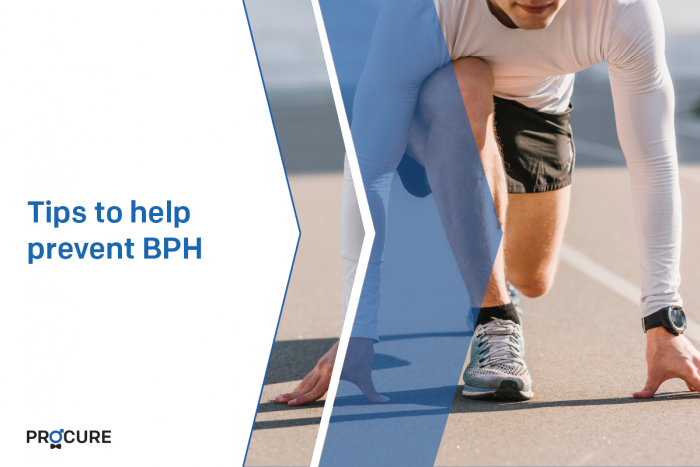Can you prevent prostate enlargement or BPH? The short answer is no, you cannot. For most men, the prostate gets bigger with age, which can lead to benign prostatic hyperplasia. Then, why an article on tips to help prevent BPH if you cannot prevent it? Let’s take a closer look.
Benign prostatic hyperplasia (BPH) refers to an increase in the size of your prostate due to excessive multiplication of your cells in the transitional zone of your prostate, that is, the region of the prostate that surrounds the urethra, the tube that connects your bladder to the penis and carries urine and semen.
The top 3 risk factors for BPH are age, family history, and ethnicity, which you cannot change. While you cannot control all of the risk factors for BPH, there are many small lifestyle changes that can help keep your prostate healthy.
Can lifestyle changes help?
Yes. If lifestyle changes cannot prevent BPH, they can still be good for your prostate. They can also help relieve your symptoms and prevent your problem from getting worse. For starters, and knowing that being overweight promotes increased abdominal pressure on the bladder, exercise and a heart-healthy diet can help manage your weight, which is great for your prostate. Exercise also helps your bladder empty at a normal rate.
To control symptoms, it may help to:
- Avoid or limit the way you use decongestants and antihistamines during colds and allergy flares, as they tighten the muscles that control urine flow and make urination (the action of urinating) more difficult.
- Do exercises to strengthen your pelvic floor muscles. You don’t know how? Click here to guide you.
- Limit the amount of caffeine and alcohol you consume. Alcohol increases the volume of urine and reduces the feeling of wanting to urinate. Coffee, on the other hand, is thought to cause a slight swelling of the prostate, which can make the urinary tract more engorged.
- Review all the foods and drinks you consume on a daily basis, as some can irritate your bladder. In addition to caffeine and alcohol, chocolate, fruits, and very acidic fruit juices, spicy foods can make your bladder more nervous and cause you to urinate urgently.
- Make sure to hydrate yourself well (1.5 to 2 liters per day), but reduce the amount of fluids you drink in the evening, especially before going to bed.
- Practice “double urination”. Urinate as much as possible, then relax for a few moments, then urinate again. It will be easier to do this while sitting than standing.
- Urinate without delay when an urgent urge is felt, so as not to distend your bladder too much.
And don’t wait to see a doctor. If an enlarged prostate is a natural phenomenon, urinary problems are not.
Discover our new animated videos
Discover three new animated videos, each equally unique and original from one to the other. Be on the lookout!
Here is the first one – Symptoms, Risk and Screening
Take the time to visit each of our pages on this website, as well as our YouTube channel, in order to get familiar with the disease with our expert lectures, our section on available resources, the support that is offered to you.
Do you have any questions or concerns? Above all, do not hesitate. Contact us at 1 855 899-2873 to discuss with a nurse specializing in uro-oncology. It’s simple and free, like all our services.
Pages of our site that might interest you
Want to know more? Just click on one of the links below.
Are you at risk?
Prostate-related diseases
Recognize the signs and symptoms
PROCURE news that may interest you
Each week, we publish a blog article. Here are a few for you.
Prostate Cancer: Did You Say Zero Symptoms?
Top 5 Men’s Health Risks
I have a little prostate pain. Is it cancer?
Written by PROCURE. © All rights reserved – 2021




